Beirut’s art scene is undergoing a revival. Here are 3 cultural institutions you should seek out
In the midst of chaos and war, Lebanon’s artistic institutions refused to surrender their visions. Now it could be their time to thrive.
Lebanon’s cultural institutions have long existed in a hostile environment. Historically, the country’s weak state has hobbled public sector sponsorship of artistic production on the European model. Yet Beirut’s arts institutions persevere. Among the most robust are Metropolis, an arthouse cinema founded in 2006; the Arab Image Foundation (AIF), an artist-led photo-archiving project launched in 1997; and Metro al-Madina, a repertory theatre founded in 2012. These private initiatives have thrived despite state indifference and in defiance of Lebanon’s political, economic and security instability.
The years since 2019 have been trying for the city: financial collapse, the 2020 port explosion, the coronavirus pandemic, political stagnation and war. The crises have reduced many to penury and emigration. Lebanon’s haemorrhage of artists, experienced administrators and other cultural labourers has undermined organisations’ capacities and institutional memory. The support of local and international donors is more uncertain, while those who have stayed have had less money and leisure time.
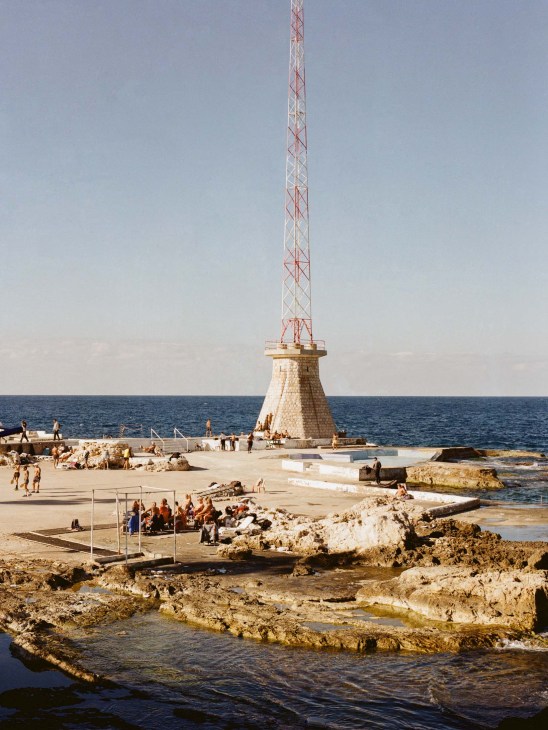
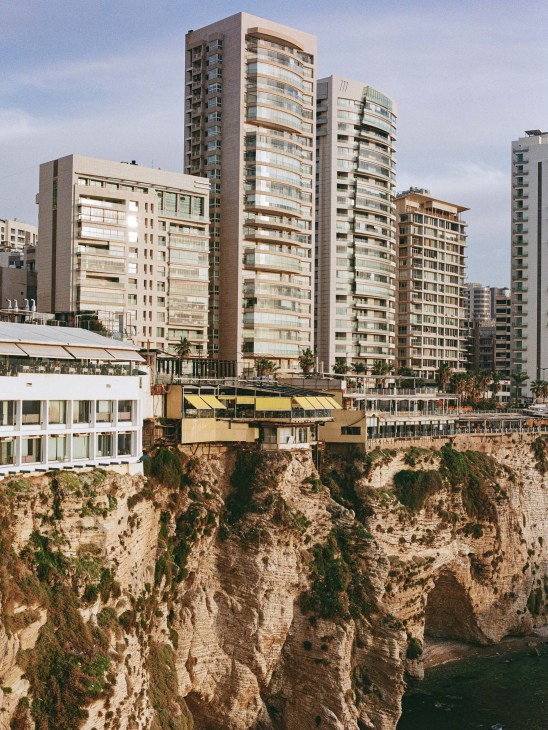
Yet, in stubborn optimism, Metropolis, AIF and Metro have each moved into new spaces during this time. When the ceasefire between Israel and Hezbollah ended the bombing of greater Beirut in November, their hopes were fuelled. Metropolis, AIF and Metro continue to face challenges but they share an unshakeable belief in the power of culture in times of crisis.
1.
The cinema
Putting arthouse film in the frame
Metropolis
“Metropolis is almost 19 years old but this is a new venue,” says Hania Mroué. “No matter how prepared you think you are, there are always things that you discover as you go.” Mroué started dancing professionally at 18, performing at the prestigious Caracalla Dance Theatre for 13 years. She later studied economics, then earned a diploma in cinema production. In 1999, Mroué co-founded a filmmaking co-operative and served as managing director of its Ayam Beirut al-Cinemaiyya (Beirut Cinema Days) festival. When asked how a dancer found herself running a film festival, she shrugs. “For the love of cinema.”
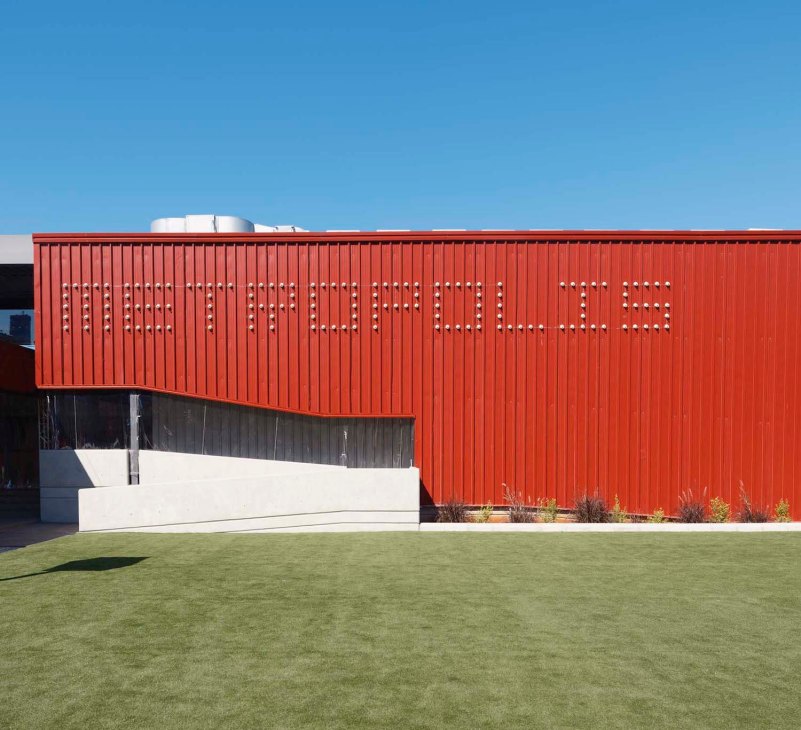
After five years without a proper location, thousands descended on the cinema’s new space on opening night in December last year. Among those to address the crowd were Hollywood star Cate Blanchett, French auteur Jacques Audiard and Lebanese director Nadine Labaki, who all sent video messages to express their support. Since then, Mroué’s 15-person team has been playing catch-up, hosting events programmed for a 2024 season severely truncated by the war. The reception has been strong, with mostly sold-out festival programmes. “It’s a diverse audience and very wide, age-wise,” says Mroué (pictured). “In general, the audience of arthouse cinemas across the world is ageing. That’s not the case in Beirut.”
Metropolis’s story began in July 2006, in the basement theatre of the Saroulla, a cinematic institution of pre-civil war Beirut. Its debut event was a run of that year’s Cannes’ Semaine de la Critique programme. A few hours after a sold-out opening, Beirut Airport was bombed – the start of a month-long war with Israel. While European guests fled via Damascus, young people from displaced families now sheltering in the theatre came to watch Metropolis’s projections. Two years later the cinema migrated to a two-screen theatre and a business partnership with Empire, a Beirut-based regional cinema and distribution chain. “It allowed us to grow,” Mroué said in 2020. “It gave us access to a beautiful cinema and allowed us to release many Lebanese and Arab films in other commercial cinemas.”
Metropolis also partnered with international film industry bodies to create workshops and training platforms for the region’s young film professionals and set up outreach programmes to bring cinema to students in Lebanon, including youngsters in refugee camps. It established Cinematheque Beirut – a Wikipedia-style online archive for the region’s neglected cinema heritage – and created an independent film distribution company.
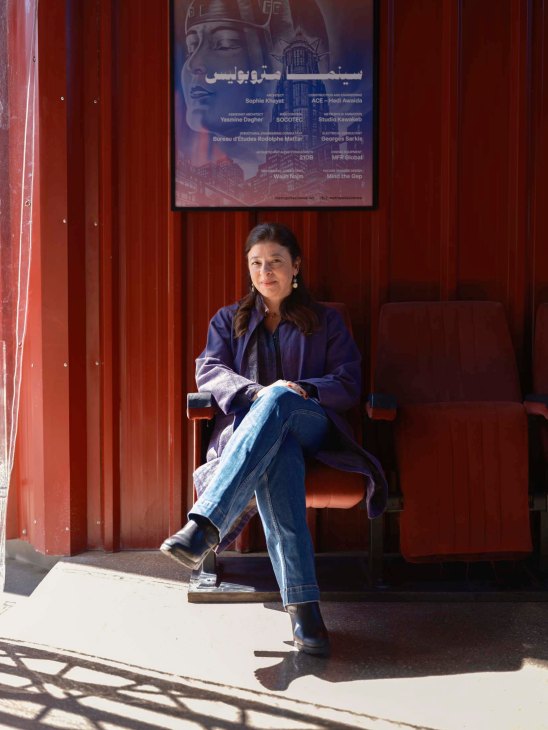
When political demonstrations erupted in October 2019, the cinema joined other Beirut arts institutions in expressing solidarity with a general strike. But when Metropolis wanted to resume programming, Empire shuttered the cinema in January 2020. Mroué’s team continued as much of its work as possible without a location. And, slowly, Mroué started gathering support for a purpose-built cinema from international, regional and domestic institutions including European embassies, cultural centres and film platforms, foundations and distributors.
The newest iteration sits in Mar Mikhael, a two-hall structure with an outdoor projection area. In April, the venue will host a new festival focusing on the cinema of the Global South. “We’re gathering international filmmakers who work with the same constraints as the Arab world: censorship, lack of support and infrastructure,” says Mroué. “It’ll be interesting to see how they deal with these challenges and still manage to create wonderful films.”
2.
The archive
Preserving the image of the Middle East
Arab Image Foundation
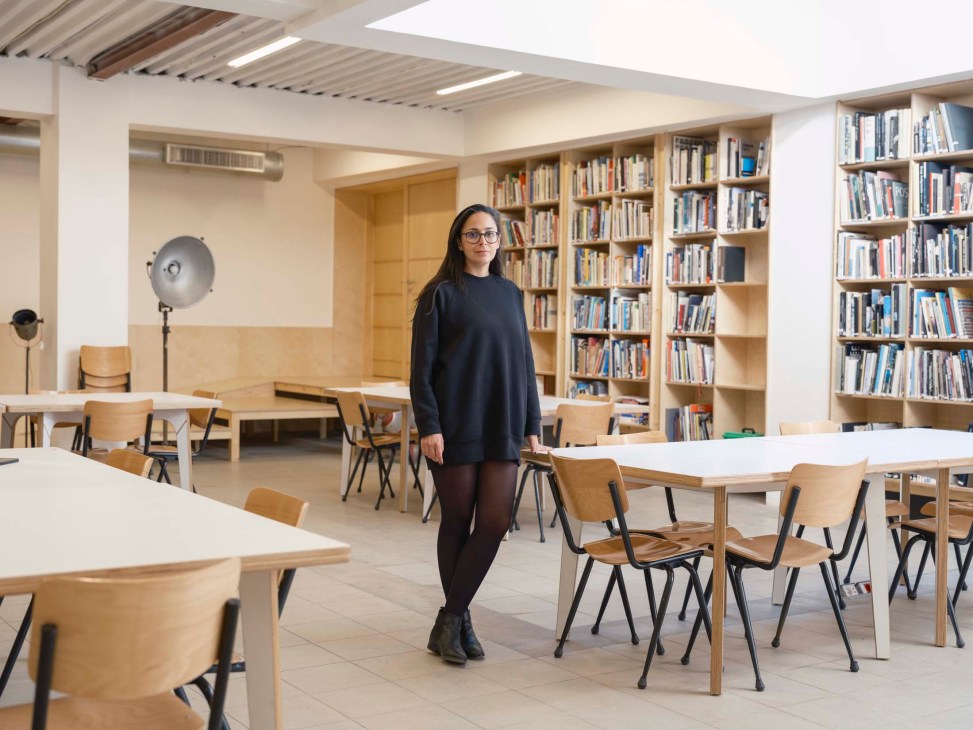
Rana Nasser Eddin is anxious to get back to normal operations. The Arab Image Foundation (AIF) director is awaiting the delivery from Kirkuk of Kurdish photographer Ramazan Zamdar’s collection of glass photographic plates dating from the 1930s to the 1980s. “In his studio photography, Zamdar used glass plate technology long after the film revolution,” says Nasser Eddin.
Six months after AIF opened the doors to its new premises in March 2024, warplanes began targeting locations across greater Beirut, delaying the shipment of the collection. “Beirut airport was functional,” says Nasser Eddin.“But no art shipper was willing to transport 13,000 glass plates to a place that’s being bombed.” The foundation activated emergency protocols, which involved packing and securing its collections and paper archive while preparing evacuation plans.

Co-founded by Akram Zaatari, Fouad Elkoury and Samer Modad, AIF is a unique project: a resource for the critical discussion of archival practices and a collection of photographic objects from the MENA region. With the Zamdar collection, the foundation will have approximately 600,000 objects from 308 collections, dating from the 1860s through to the 1990s and spanning 50 countries. Beirut’s port blast ruined the foundation’s previous offices – a cramped flat 300 metres from the explosion – but the collection emerged intact.
The foundation now nests in a three-story suite of rooms in Beirut’s Aresco Center, a short stroll from Lebanon’s National Library and three universities. The workspaces (where AIF’s six-person technical team conserves, documents and digitises images and preserves them in climate-controlled storage), the library and 42-seat auditorium, which will soon house a Beirut filmmaking co-operative, occupy the basement. At ground level, gallery-style spaces with shopfront windows allow for exhibitions and workshops. Public Works, a critically minded research and design studio, operates from AIF’s mezzanine.
In 2024, AIF’s library opened to the public. The stacks combine its specialist print library with Dawawine bookshop’s collections dedicated to cinema, sound and performance, and the library of Public Works. AIF launched its public programme in March with a series of screenings and talks about politics and film translation.
3.
The theatre
Inspiring future generations to take the stage
Metro al-Madina
Hisham Jaber’s flat overlooks Beirut’s derelict Holiday Inn, which was ruined during Lebanon’s civil war a few months after it opened in 1974. Through its gaping windows, the Mediterranean is clearly visible. “There will be peace, it seems,” says Jaber, glancing into his coffee. “We’ve faced many problems these past 13 years but now we have a clearer vision of what we should do.”
The flat is a short walk away from the Metro al-Madina theatre, which Jaber co-founded. He is well known for his on-stage persona: cabaret emcee Roberto Kobrolsi, notable for his mop of black curls, spectacles and fondness for silver lamé. Since 2002, Jaber has written and directed more than a dozen plays, musicals, stand-up comedy routines and cabarets that have been staged around Lebanon and the wider region. While Jaber is invested in recent history, the performances he’s staged tend to favour the light-hearted and sardonic over the tragic. And when asked why he became an entertainer, it’s a simple answer. “I like people to be happy,” he says.
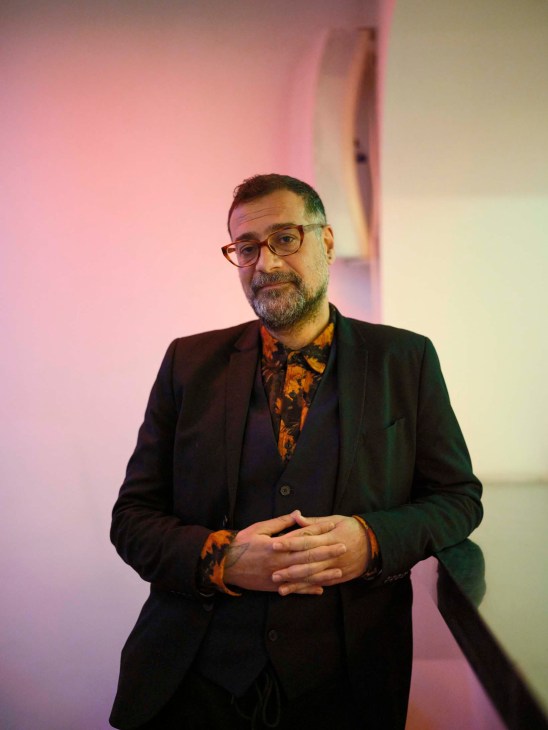
Like Metropolis cinema, Metro was born in Saroulla’s little theatre. But since July 2023 it has made its home at the theatre of the Aresco Center, next door to The Arab Image Foundation (AIF). “We moved during the biggest crisis of our generation,” says Jaber. “They said we were mad but it was a good move. You feel new energy in the hall.” Renovated and redesigned by architect Paul Kaloustian, Metro’s terraced hall can seat more than 700 guests at tables in front of the 14-metre-wide stage. The venue is “a bit trippy”, says Jaber. “It’s like something from a 1960s film about the future or outer space.”
Currently headlining at Metro is Al-Souq al-Oumoumi (The Public Market), a musical comedy set in the early 20th century, in a thriving red-light district on Beirut’s Mutanabbi Street. Featuring 18 vocalists and musicians, the show was written and directed by Jaber, who created the music with composer Makram Aboul Hosn.
During the recent war, Metro unveiled 3al-Qamar (On the Moon), a series of intimate Tuesday evening listening sessions. “We invite two or three solo musicians to try something new,” says Jaber. “It’s a lab for small gigs that could later develop into a main stage show.” Several new performers have also emerged from Mehaniya, a free, two-year performing-arts programme that the troupe created in 2022. Rather than soliciting donations, the theatre invites regular clients to become partners in the company, though some support comes from the Arab Fund for Arts and Culture (AFAC) and Unesco. AFAC and Culture Resource, another regional cultural support agency, also made a grant to Metro after the Beirut port blast.
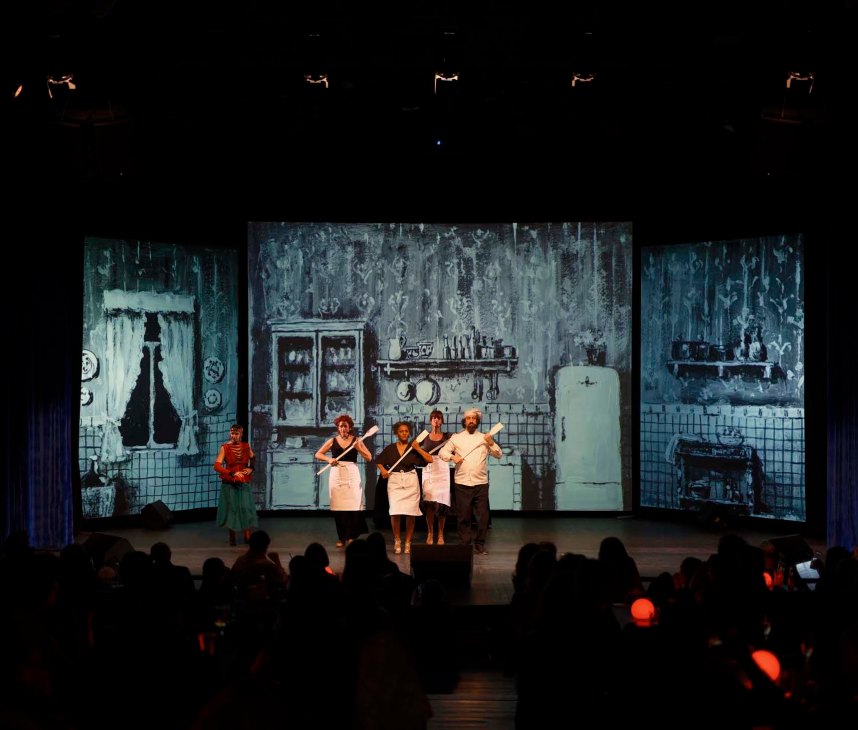
Jaber says that peace will be a time for consolidation and experimentation, and it should bring younger artists with fresh ideas to the theatre. “Next year, we might start working with new technologies. With AI – sensors and suits – you can bring a new dimension to onstage visuals.” He sips his coffee. “And it’s cheaper. Thank god.”
While much in Lebanon is still in ruins, Jaber echoes the sentiments of Mroué and Nasser Eddin, expressing relief and enthusiasm at the prospect of something resembling normality in Lebanon. Like Metropolis and AIF, Metro has come through the crises on firmer ground than before 2019. The contingency, though, never abates entirely. “We are still recovering from the extreme violence that we lived through in 2024,” says Mroué. “We’re happy, but cautious. We know how fragile this stability is.”


